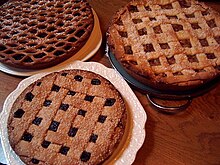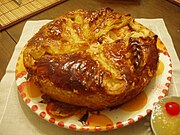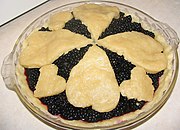LabLynx Wiki
Contents


A pie is a baked food that is made from a pastry crust. The common filling of a pie is savoury (with meat and/or vegetables) and gravy. Pies often have a round or oval shape.
A pie is cooked beforehand: this is the main idea. It can be cooked days before it is eaten. The crust keeps it in good condition if the pie is kept in a cool place. The pie can be eaten warm or cold.
Ingredients
Pastry
Pies can be either:
- "filled", where a dish is covered by a pastry crust and the filling is placed on top of that,
- "top-crust," where the filling is placed in a dish and covered with a pastry/potato mash top, or
- "two-crust," with the filling completely enclosed in the pastry shell.
Filling
Pies are baked with a shell or crust, which is usually made of pastry. The filling may be fruit, meat, fish, vegetables, cheeses, creams, chocolate, custards, nuts, or other sweet or savoury ingredients.
Savoury pies
- This list is not meant to be complete.
|
 |
Sweet pies
- This list is not meant to be complete.
Some of these pies are pies in name only. An example is the Boston cream pie, which is a cake. Many fruit and berry pies are very similar, with the only difference being the fruit used in filling.
 |
Regional variations
There are many different kinds of pie. People from different countries often have their own different type of pie.
Great Britain, Australia and New Zealand
Meat pies with fillings such as steak and cheese, steak and kidney, minced beef or chicken and mushroom are popular in the United Kingdom, Australia and New Zealand as take-away snacks. They are also served with chips as an alternative to fish and chips at British chip shops. A "Wigan kebab" is a pie, put between halves of a flour-covered bap (bun). This is called a barm cake. The combination of pie and mash is associated with London. Shepherd's pie (which does not involve pastry) is a favourite with people in Britain.
Most meat pies are served hot. Pork pies usually have a very high fat content and may be served cold. These meat pies contain beef and gravy in a shortcrust piecase, often with a flaky top. Many bakeries and specialty shops sell gourmet pies. Adelaide (a city in Australia) has the pie floater, where a meat pie is floated in a plate of thick green pea soup.
North America

Pot pies with a flaky crust and bottom are a popular American dish. They usually have a filling of meat (often beef, chicken or turkey), gravy, and mixed vegetables (potatoes, carrots and peas). Frozen pot pies are often sold in individual serving size.
Fruit pies may be served with a scoop of ice cream, a style known in North America as à la mode. Apple pie is a traditional choice. This combination, and possibly the name as well, is thought to have been popularized in the mid-1890s in the United States.[1]
A tourtière is a meat pie. It was first created in Quebec, Canada. It is usually made with ground pork, veal, or beef.
Rest of world
Many countries have their own style of pie. For example:
- Spanakopita is a savory pie common in Greece. It has a filling of spinach and cheese, and spices.
- Buko pie is a traditional Filipino pie with coconut filling.
- Pyrih (or pirog in Russian) is a Ukrainian pie. It may be sweet and contain cottage cheese, or fruits like apple, plums or various berries. Savoury versions may contain meat, fish, mushrooms, cabbage, buckwheat or potato.
- Torta caprese is a traditional Italian chocolate and almond or walnut pie. It is sometimes made with a small amount of liqueur. The name refers to the island of Capri.
- Torta de Santiago is a type of almond pie from the Galicia region in Spain. The filling is mostly ground almonds, eggs and sugar.
- Vlaai is a pie from the Limburg region in the Netherlands. It comes in many different varieties of fruit fillings.
- Zelnik is a traditional Bulgarian pastry. It is made of thin crusts filled with either cheese and eggs, spinach, sorrel, crumbled meat, leeks and rice, or very often in the winter period, brined cabbage.
Pie throwing
Cream filled or topped pies are favourite props for humour, particularly when aimed at people who are too serious. Throwing a pie in a person's face has been a staple of movie comedy since the early days of the movies. It is often associated with clowns in popular culture.
Pranksters have taken to targeting politicians and celebrities with their pies, an act called pieing. Activists sometimes engage in the pieing of political and social targets as well. "Pieing" can result in injury to people and pie throwers can face assault or more serious charges.[2]
References
- ↑ ""Remember the à la mode!" (pie à la mode)". Retrieved 2007-10-29.
- ↑ "The Smoking Gun: Archive". Archived from the original on 2010-08-02. Retrieved 2008-05-05.

















